Posts Tagged ‘Farmers’ (11 found)
မတၱရာၿမိဳ႕နယ္မွာ လယ္သိမ္းခံ ေတာင္သူေတြ ဆႏၵျပ
မႏၱေလးတိုင္းေဒသႀကီး၊ မတၱရာၿမိဳ႕နယ္က ေက်းရြာ ၇ ရြာမွာ သမ၀ါယမ၀န္ႀကီးဌာနက သိမ္းယူထားတဲ့ လယ္ေျမ ဧက ၆၀၀ ေက်ာ္ဟာ သမ၀ါယမအသင္းက ပိုင္ဆိုင္ေၾကာင္း ေျမယာပိုင္ဆိုင္မွဳ ပံုစံ(၇) ခ်ေပးလိုက္တဲ့အတြက္ ေဒသ ခံတစ္ရာေက်ာ္က ဒီကေန႔ မတၱရာၿမိဳ႕မွာ ကန္႔ကြက္ဆႏၵျပၾကပါတယ္ […]
• • •Protesters Allege Corruption of Judge in Irrawaddy Division
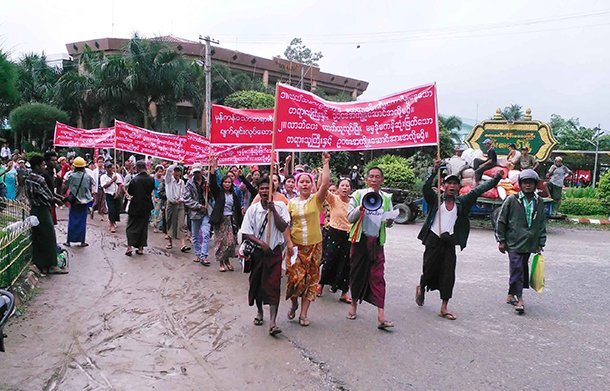 PATHEIN, Irrawaddy Division — More than 200 locals staged a demonstration in front of the local courthouse against the rulings of a judge in Pantanaw Township, Irrawaddy Division, last week.
PATHEIN, Irrawaddy Division — More than 200 locals staged a demonstration in front of the local courthouse against the rulings of a judge in Pantanaw Township, Irrawaddy Division, last week.
Pantanaw locals allege that the township judge, Thida One, has taken bribes, issued unjust rulings, delayed trials and refused defendants’ bail […]
• •Statement of Ethnic Community Development Forum and the Customary Land Protection Committee Concerning Myanmar’s National Land Use Policy (Draft)
On November 1 and 2, 2014 representatives of more than 30 organizations of civil society and farmers networks came together in a workshop to review and analyze the draft national land use policy of Myanmar. […]
• • •New National Land Use Policy Must Reflect the Concerns of those Affected
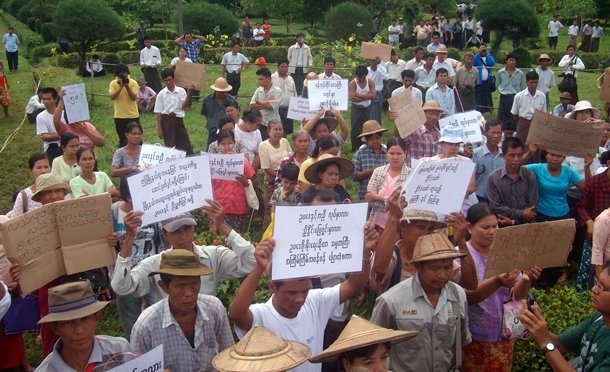 The Burma Government released its draft land use policy document and opened it up for consultations with the public. Despite this positive sign, the time for consultations is inadequate with no proper mechanism or space created for the meaningful participation of affected communities in order for their concerns to be reflected in the draft. The draft document itself has been heavily criticized for serving to further empower investors over small scale farmers.
The Burma Government released its draft land use policy document and opened it up for consultations with the public. Despite this positive sign, the time for consultations is inadequate with no proper mechanism or space created for the meaningful participation of affected communities in order for their concerns to be reflected in the draft. The draft document itself has been heavily criticized for serving to further empower investors over small scale farmers.
Since the beginning of the reform process in 2011, land grabbing, a practice that the previous military regime engaged in regularly, has hit new heights as a flurry of investors seek opportunities in previously untapped markets and the Burma Government liberalizes the economy. A prime example of this is the Dawei Special Economic Zone (SEZ) Project, a joint Thailand–Burma Government initiative that is seeking private investment to create one of the largest industrial zones in Asia. A report released by Dawei Development Association on 21 October 2014 highlights how 20-36 villages will be negatively affected. Concerns iterated by the local communities show that they have “lost farmlands and natural resources that are vital to their livelihoods, without prior information.” Furthermore “there was no meaningful consultation, and a deeply flawed compensation process.”
Land grabbing is often done with protection from the military, or by the military itself, for factories, infrastructure projects, mono-crop plantations, or military bases, and as with the Dawei SEZ case, usually without adequate or indeed, any compensation. It is a nationwide problem, both in ethnic areas, as documented by the Human Rights Foundation of Monland and Karen Human Rights Group, while in central Burma and delta areas, land grabbing is common place. Given that around 70% of the population of Burma is engaged in agriculture, and it is agricultural lands that are most often confiscated, it is one of the most pressing issues for Burma today […]
• • •Joint Submission on the Proposed World Bank Group’s Country Partnership Framework (CPF) in Myanmar
We, the undersigned organizations in Myanmar and other countries, respectfully submit these comments to the World Bank Group to inform the development of the Country Partnership Framework for Myanmar. We belong to civil society organizations and ethnic community networks with a focus on human rights, environment, peace and mediation, and good governance with significant expertise and experience in Myanmar […]
• • •Villagers form Petition to Oppose Rangoon City Project
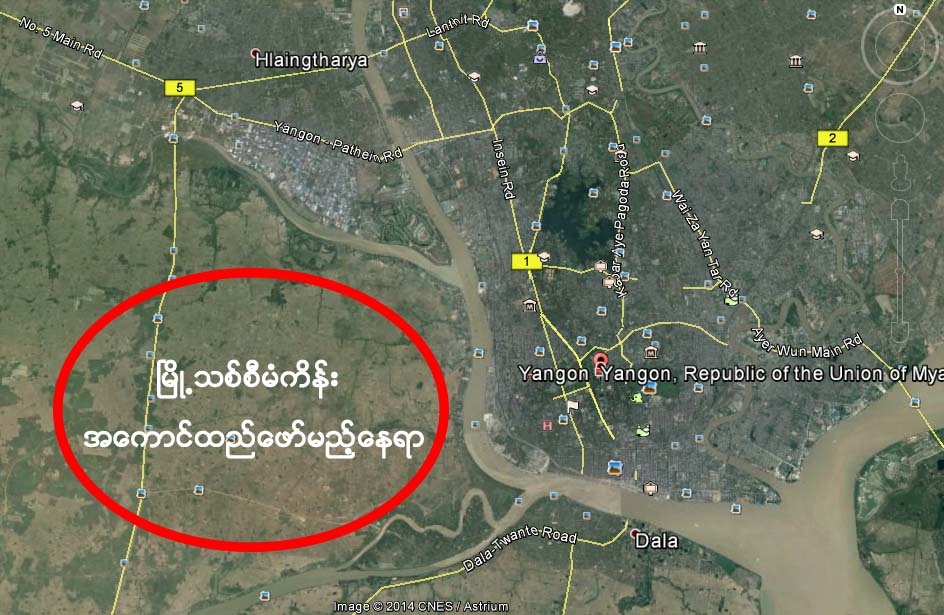 A group of rural villagers living west of Rangoon said they are forming a petition to protest plans to build an extensive residential and commercial development on 30,000 acres (121 sq.km) of land in their area.
A group of rural villagers living west of Rangoon said they are forming a petition to protest plans to build an extensive residential and commercial development on 30,000 acres (121 sq.km) of land in their area.
Local residents of Ton Tay [Twante] Township told DVB that they will send their petition to the Burmese president.
“They will destroy the paddy fields and we will have rice shortages,” said local farmer Aung Pe. “Many of the people here know only about farming. They have no other livelihood. I think that some rich people are buying out the farmers […]
• •A New Dawn for Equitable Growth in Myanmar?: Making the Private Sector Work for Small-Scale Agriculture
A new wave of political reforms have set Myanmar on a road to unprecedented economic expansion, but without targeted policy efforts and regulation to level the playing field, the benefits of new investment will filter down to only a few, leaving small-scale farmers – the backbone of the Myanmar economy […]
• • •Burma’s Military and Economic Elites Continue to Steal the Livelihoods of Rural People
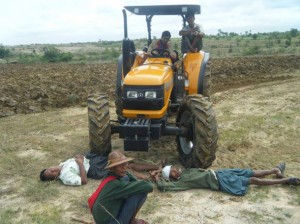 As more and more farmers are losing their lands and livelihoods to corrupt businesses long-associated with the Burma Army, the current government is doing its best to preserve the interests of these wealthy elites at the expense of disempowered rural people. With the onset of the gold rush into Burma, these cronies of the military-backed government are abusing their position to reap the financial rewards of the potential flood of new investment while rural people, who make up 90% of the population, are losing their livelihoods.
As more and more farmers are losing their lands and livelihoods to corrupt businesses long-associated with the Burma Army, the current government is doing its best to preserve the interests of these wealthy elites at the expense of disempowered rural people. With the onset of the gold rush into Burma, these cronies of the military-backed government are abusing their position to reap the financial rewards of the potential flood of new investment while rural people, who make up 90% of the population, are losing their livelihoods.
One such example is from Bwi Daw Village in Kachin State where residents reported last week of local businessmen confiscating their land at gunpoint and subsequently destroying their crops with tractors to make room for a fish farm. For these villagers, there is no legal remedy and have now lost the ability to put food on the table for their families […]
Farmers Block Tractor to Protest Land Grabs
 Three farmers from Mandalay Division, whose land has been confiscated, lay in front of a tractor belonging to the accused company on Wednesday in order to halt work and highlight their claims.
Three farmers from Mandalay Division, whose land has been confiscated, lay in front of a tractor belonging to the accused company on Wednesday in order to halt work and highlight their claims.
The farmers, from Oh Pyun Kan Village of Wundwin Township, Meikhtila District, accuse Kaungkin Company of illegally seizing land that has been in their families for generations and pledged to fight until death to win back what was stolen […]

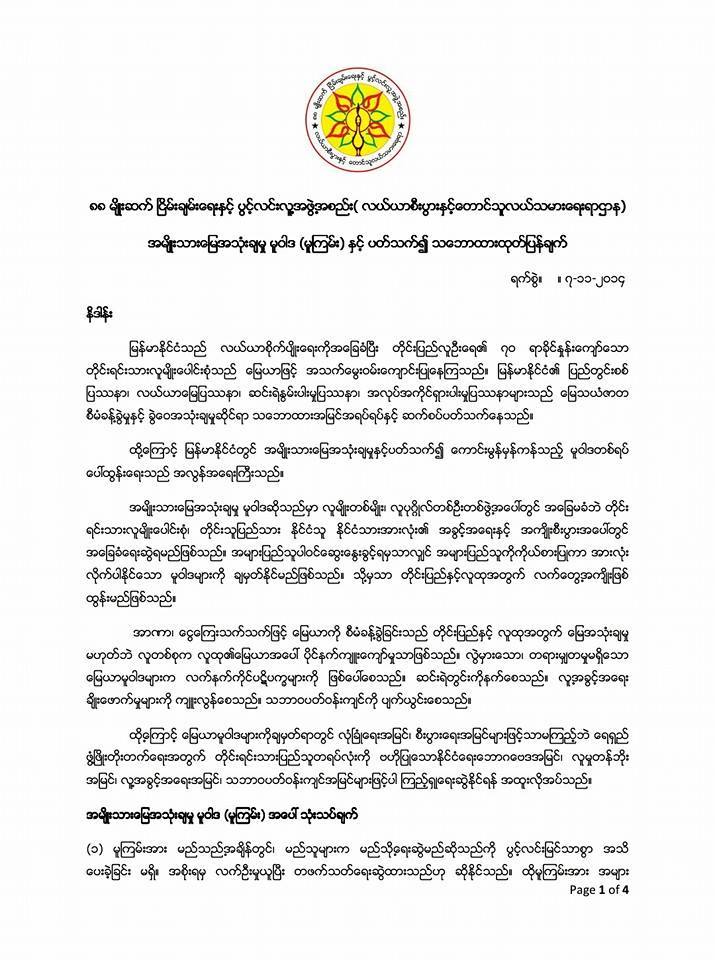








 All posts
All posts